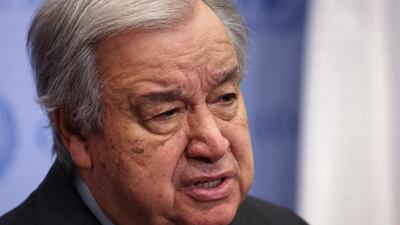Live updates: Follow the latest on Israel-Gaza
UN Secretary General Antonio Guterres accused Israel on Tuesday of failing to meet its "unequivocal obligations" as an occupying power in Gaza.
"More than an entire month has passed without a drop of aid into Gaza. No food. No fuel. No medicine. No commercial supplies. As aid has dried up, the floodgates of horror have reopened," Mr Guterres told reporters.
Quoting the Geneva Conventions governing treatment of people in war, he said that the "occupying power has the duty of ensuring food and medical supplies of the population" as well as ensuring and maintaining "medical and hospital establishments and services, public health and hygiene in the occupied territory". He added that all medical personnel must also be allowed to carry out their duties.
Mr Guterres said that under the conventions, if civilians in an occupied territory do not have adequate supplies, the occupying force must “agree to relief schemes on behalf of the said population and shall facilitate them by all means at its disposal".
“None of that is happening today,” Mr Guterres said. “No humanitarian supplies can enter Gaza.”
Israel, which has denied being the occupying power in Gaza since withdrawing in 2005, has faced mounting international criticism over the humanitarian crisis in the Palestinian enclave during its military campaign.
Israel cut off aid to Gaza in early March and later resumed intense bombardment across the territory as well as ground operations.
The war, which started after Hamas's October 7 attack on southern Israel, has devastated Gaza, with widespread hunger, a collapsing medical system and limited aid access. Israel maintains that it allows humanitarian assistance to enter but blames Hamas for disruptions.
In a joint statement on Monday, the heads of several UN agencies said many Gazans are “trapped, bombed and starved again, while, at crossing points, food, medicine, fuel and shelter supplies are piling up, and vital equipment is stuck” outside of the blockaded territory.
Mr Guterres rejected new Israeli “authorisation mechanisms” for aid delivery, saying they could lead to "further controlling and callously limiting aid down to the last calorie and grain of flour".
"Let me be clear: We will not participate in any arrangement that does not fully respect the humanitarian principles: humanity, impartiality, independence and neutrality," he said.
He also raised the alarm about the situation in the West Bank. "The current path is a dead end, totally intolerable in the eyes of international law and history," Mr Guterres said. "And the risk of the occupied West Bank transforming into another Gaza makes it even worse."
World record transfers
1. Kylian Mbappe - to Real Madrid in 2017/18 - €180 million (Dh770.4m - if a deal goes through)
2. Paul Pogba - to Manchester United in 2016/17 - €105m
3. Gareth Bale - to Real Madrid in 2013/14 - €101m
4. Cristiano Ronaldo - to Real Madrid in 2009/10 - €94m
5. Gonzalo Higuain - to Juventus in 2016/17 - €90m
6. Neymar - to Barcelona in 2013/14 - €88.2m
7. Romelu Lukaku - to Manchester United in 2017/18 - €84.7m
8. Luis Suarez - to Barcelona in 2014/15 - €81.72m
9. Angel di Maria - to Manchester United in 2014/15 - €75m
10. James Rodriguez - to Real Madrid in 2014/15 - €75m
Spider-Man%202
%3Cp%3E%3Cstrong%3EDeveloper%3A%3C%2Fstrong%3E%20Insomniac%20Games%0D%3Cbr%3E%3Cstrong%3EPublisher%3A%3C%2Fstrong%3E%20%20Sony%20Interactive%20Entertainment%0D%3Cbr%3E%3Cstrong%3EConsole%3A%20%3C%2Fstrong%3EPlayStation%205%0D%3Cbr%3E%3Cstrong%3ERating%3A%3C%2Fstrong%3E%205%2F5%3C%2Fp%3E%0A
The specs
Engine: 3-litre twin-turbo V6
Power: 400hp
Torque: 475Nm
Transmission: 9-speed automatic
Price: From Dh215,900
On sale: Now
Other workplace saving schemes
- The UAE government announced a retirement savings plan for private and free zone sector employees in 2023.
- Dubai’s savings retirement scheme for foreign employees working in the emirate’s government and public sector came into effect in 2022.
- National Bonds unveiled a Golden Pension Scheme in 2022 to help private-sector foreign employees with their financial planning.
- In April 2021, Hayah Insurance unveiled a workplace savings plan to help UAE employees save for their retirement.
- Lunate, an Abu Dhabi-based investment manager, has launched a fund that will allow UAE private companies to offer employees investment returns on end-of-service benefits.
Results
2pm: Maiden (TB) Dh60,000 (Dirt) 1,200m, Winner: Mouheeb, Tom Marquand (jockey), Nicholas Bachalard (trainer)
2.30pm: Handicap (TB) Dh68,000 (D) 1,200m, Winner: Honourable Justice, Royston Ffrench, Salem bin Ghadayer
3pm: Handicap (TB) Dh84,000 (D) 1,200m, Winner: Dahawi, Antonio Fresu, Musabah Al Muhairi
3.30pm: Conditions (TB) Dh100,000 (D) 1,200m, Winner: Dark Silver, Fernando Jara, Ahmad bin Harmash
4pm: Maiden (TB) Dh60,000 (D) 1,600m, Winner: Dark Of Night. Antonio Fresu, Al Muhairi.
4.30pm: Handicap (TB) Dh68,000 (D) 1,600m, Winner: Habah, Pat Dobbs, Doug Watson
WHY%20AAYAN%20IS%20'PERFECT%20EXAMPLE'
%3Cp%3EDavid%20White%20might%20be%20new%20to%20the%20country%2C%20but%20he%20has%20clearly%20already%20built%20up%20an%20affinity%20with%20the%20place.%3Cbr%3E%3Cbr%3EAfter%20the%20UAE%20shocked%20Pakistan%20in%20the%20semi-final%20of%20the%20Under%2019%20Asia%20Cup%20last%20month%2C%20White%20was%20hugged%20on%20the%20field%20by%20Aayan%20Khan%2C%20the%20team%E2%80%99s%20captain.%3Cbr%3E%3Cbr%3EWhite%20suggests%20that%20was%20more%20a%20sign%20of%20Aayan%E2%80%99s%20amiability%20than%20anything%20else.%20But%20he%20believes%20the%20young%20all-rounder%2C%20who%20was%20part%20of%20the%20winning%20Gulf%20Giants%20team%20last%20year%2C%20is%20just%20the%20sort%20of%20player%20the%20country%20should%20be%20seeking%20to%20produce%20via%20the%20ILT20.%3Cbr%3E%3Cbr%3E%E2%80%9CHe%20is%20a%20delightful%20young%20man%2C%E2%80%9D%20White%20said.%20%E2%80%9CHe%20played%20in%20the%20competition%20last%20year%20at%2017%2C%20and%20look%20at%20his%20development%20from%20there%20till%20now%2C%20and%20where%20he%20is%20representing%20the%20UAE.%3Cbr%3E%3Cbr%3E%E2%80%9CHe%20was%20influential%20in%20the%20U19%20team%20which%20beat%20Pakistan.%20He%20is%20the%20perfect%20example%20of%20what%20we%20are%20all%20trying%20to%20achieve%20here.%3Cbr%3E%3Cbr%3E%E2%80%9CIt%20is%20about%20the%20development%20of%20players%20who%20are%20going%20to%20represent%20the%20UAE%20and%20go%20on%20to%20help%20make%20UAE%20a%20force%20in%20world%20cricket.%E2%80%9D%C2%A0%3C%2Fp%3E%0A
PROFILE OF HALAN
Started: November 2017
Founders: Mounir Nakhla, Ahmed Mohsen and Mohamed Aboulnaga
Based: Cairo, Egypt
Sector: transport and logistics
Size: 150 employees
Investment: approximately $8 million
Investors include: Singapore’s Battery Road Digital Holdings, Egypt’s Algebra Ventures, Uber co-founder and former CTO Oscar Salazar
Getting%20there%20
%3Cp%3E%3Ca%20href%3D%22https%3A%2F%2Fwww.thenationalnews.com%2Ftravel%2F2023%2F01%2F12%2Fwhat-does-it-take-to-be-cabin-crew-at-one-of-the-worlds-best-airlines-in-2023%2F%22%20target%3D%22_self%22%3EEtihad%20Airways%20%3C%2Fa%3Eflies%20daily%20to%20the%20Maldives%20from%20Abu%20Dhabi.%20The%20journey%20takes%20four%20hours%20and%20return%20fares%20start%20from%20Dh3%2C995.%20Opt%20for%20the%203am%20flight%20and%20you%E2%80%99ll%20land%20at%206am%2C%20giving%20you%20the%20entire%20day%20to%20adjust%20to%20island%20time.%20%C2%A0%3C%2Fp%3E%0A%3Cp%3ERound%20trip%20speedboat%20transfers%20to%20the%20resort%20are%20bookable%20via%20Anantara%20and%20cost%20%24265%20per%20person.%20%C2%A0%3C%2Fp%3E%0A
Groom and Two Brides
Director: Elie Samaan
Starring: Abdullah Boushehri, Laila Abdallah, Lulwa Almulla
Rating: 3/5
Fifa Club World Cup quarter-final
Kashima Antlers 3 (Nagaki 49’, Serginho 69’, Abe 84’)
Guadalajara 2 (Zaldivar 03’, Pulido 90')
WOMAN AND CHILD
Director: Saeed Roustaee
Starring: Parinaz Izadyar, Payman Maadi
Rating: 4/5
COMPANY%20PROFILE
%3Cp%3ECompany%20name%3A%20CarbonSifr%3Cbr%3EStarted%3A%202022%3Cbr%3EBased%3A%20Dubai%3Cbr%3EFounders%3A%20Onur%20Elgun%2C%20Mustafa%20Bosca%20and%20Muhammed%20Yildirim%3Cbr%3ESector%3A%20Climate%20tech%3Cbr%3EInvestment%20stage%3A%20%241%20million%20raised%20in%20seed%20funding%3Cbr%3E%3C%2Fp%3E%0A


